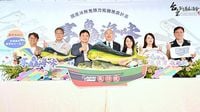In a strategic move to support businesses grappling with the financial implications of tariffs, HSBC has launched a new financing service called HSBC TradePay for Import Duties. This initiative aims to assist companies in managing the additional costs arising from the trade war initiated by President Donald Trump’s tariffs.
HSBC TradePay for Import Duties is an extension of an existing program that was introduced in 2023, designed to help businesses navigate the complexities of international trade. The London-headquartered banking giant stated that the platform can be utilized to cover the cost of import duties, thereby alleviating some of the financial burdens imposed by tariffs.
Since its launch, HSBC has reportedly made $2.3 billion in trade finance accessible to businesses worldwide through TradePay. Vivek Ramachandran, head of global trade solutions at HSBC, emphasized the benefits of this service, stating, "By settling import duties directly and frictionlessly through HSBC TradePay, our US clients have more visibility and control over their working capital at the time they need it most." This reflects a growing recognition of the importance of cash flow management amid fluctuating trade policies.
The urgency of this service comes in the wake of President Trump’s announcement of the so-called "Liberation Day" tariffs in April 2025, which have left many U.S. businesses scrambling to adapt. Some companies have opted to absorb the increased costs, while others have passed these expenses onto consumers, further complicating the economic landscape.
Adding to the context, HSBC recently reported a profit before tax of $9.5 billion for the first quarter of 2025, which surpassed analysts’ forecasts of $7.8 billion. The bank exceeded revenue expectations by $980 million and announced a substantial share buyback program of up to $3 billion, signaling strong financial health.
Meanwhile, lawmakers in Taiwan are calling for increased government support for the fishing industry, which is facing challenges due to U.S. tariffs. Approximately 70 percent of Taiwan’s mahi mahi is exported to the U.S., and the industry is feeling the pressure from tariff policies. At a fisheries sale promotion event held at the Legislative Yuan, Democratic Progressive Party (DPP) legislators Chuang Jui-hsiung and Asenay Daliyalrep highlighted the critical situation.
Chuang noted that Taiwan’s catch of mahi mahi accounts for 10 percent, or roughly 3,000 tonnes, of the annual global supply, with a significant portion destined for the U.S. However, the fish is often processed in countries like Vietnam and Thailand, which are also subject to heavy tariffs, causing many fishers to hesitate in catching mahi mahi for export.
In response to these challenges, Chuang urged the Ministry of Agriculture to implement subsidies for exports and enhance market expansion efforts. He suggested that the government should also support cold chain logistics and local processing to add value to the fishery products. Legislative Speaker Han Kuo-yu echoed these sentiments, expressing concern that fishers' efforts are not compensated fairly, particularly in light of U.S. tariff policies.
President Trump had previously imposed a 32 percent tariff on imports from Taiwan on April 2, 2025, but announced a temporary 90-day pause on its implementation just a week later. However, a universal 10 percent tariff remains applicable to most imports entering the U.S., continuing to create uncertainty for Taiwanese exporters.
As the Taiwanese government seeks to bolster its fishing industry, Minister of Agriculture Chen Junne-jih indicated that the ministry would aid agricultural associations in obtaining Marine Stewardship Council certification to facilitate sales in the U.S. and beyond. Additionally, efforts are being made to promote domestic sales of mahi mahi through improved packaging and collaboration with fishery associations.
On a different note, Taiwan is also facing environmental challenges. The Central Weather Administration (CWA) issued a heat alert for southeastern Taiwan on May 10, 2025, forecasting temperatures soaring as high as 36°C. Areas such as Kaohsiung’s Neimen District and Pingtung County’s Neipu Township are under an orange heat alert, signaling extreme weather conditions.
Moreover, the CWA reported that a magnitude 5.9 earthquake struck approximately 33 kilometers off the coast of Hualien City on May 9, 2025. This earthquake was part of a series of tremors, with six other quakes of magnitude 4 or higher occurring in the vicinity. The CWA has advised residents to remain vigilant for potential aftershocks over the coming days.
In the political sphere, recall drives against lawmakers in Hualien, Taoyuan, and Hsinchu have reached the second-stage threshold. Campaigners targeting Chinese Nationalist Party (KMT) Legislator Yen Kuan-heng in Taichung reported they are closing in on their signature goal, needing about 500 more signatures to proceed. Other campaigns against KMT lawmakers Johnny Chiang, Yang Chiung-ying, and Lo Ting-wei are also nearing their respective thresholds, indicating a growing momentum for political accountability.
The combination of economic pressures from tariffs, environmental challenges, and political movements illustrates the complex landscape facing Taiwan and its industries. As businesses and lawmakers navigate these turbulent waters, the need for effective strategies and government support remains paramount.


